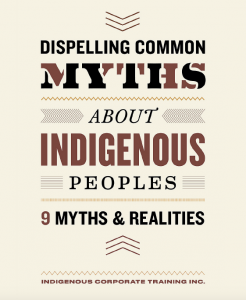Chelsea Vowel’s Indigenous Rights discusses five different interrelated themes:
- The terminology of relationships
- Culture and identity
- Myth-busting
- State violence
- Land, Learning, Law, and Treaties
This book is an excellent guide for addressing pre-conceived notions about Indigenous People. The book is primarily about the relationships between Indigenous and non-Indigenous peoples. Throughout my studies of Indigenous education, I have realized that it is essential to reflect on what it means to be a settler and my role within my relationship with Indigenous people.
One of my favourite sections of Vowel’s book is “Myth-busting.” As I live in rural Saskatchewan, I have heard all the myths Vowel discusses in her book. Vowel provides factual information on how and why these myths are false and equips the reader with the knowledge to confront those myths. I found an online keynote that Chelsea Vowel gave titled Stories that Reveal, Stories that Conceal: Pushing back against Settler Myth-Making. In her keynote, Chelsea talks about the work that needs to be done with recognizing truth before we move forward with reconciliation.
Chelsea Vowel’s book and speech are relevant to my research topic because she discusses the inaccessibility of language. She discusses how many Indigenous languages are within Universities and how it is essential to return the languages to their home communities. Chelsea Vowel also shares how through social media and blogging was able to make her message more accessible to more people. Chelsea shares the myth in her keynote that many believe that the kinship that Indigenous people have that is beyond just with humans, that extends to animals, non-living, and spiritual beings is something that is based in the past. She discusses how that idea is false; it is current and relevant and that Indigenous people can carry this idea far into the future in a sustainable way.
The following link provides online access to part 1 of Chelsea Vowel’s book: https://www.portageandmainpress.com/content/download/17819/220849/version/1/file/9781553796800_IndigenousWrites_excerpt.pdf
